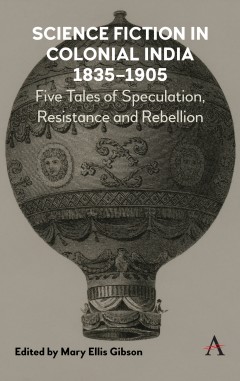Science Fiction in Colonial India, 1835–1905
Five Stories of Speculation, Resistance and Rebellion
Edited by Mary Ellis Gibson
Other Formats Available:
E-Book- About This Book
- Reviews
- Author Information
- Series
- Table of Contents
- Links
- Podcasts
About This Book
‘Science Fiction in Colonial India, 1835–1905’ shows, for the first time, how science fiction writing developed in India years before the writings of Jules Verne and H. G. Wells. The five stories presented in this collection, in their cultural and political contexts, help form a new picture of English language writing in India and a new understanding of the connections among science fiction, modernity and empire.
Speculative fiction developed early in India in part because the intrinsic dysfunction and violence of colonialism encouraged writers there to project alternative futures, whether utopian or dystopic. These stories, created by Indian and British writers, responded to the intellectual ferment and political instabilities of colonial India. They add an important dimension to our understanding of Victorian empire, science fiction and speculative fictional narratives. They provide new examples of the imperial and the anti-imperial imaginations at work.
In Victorian India technological change was necessarily understood through differences between the colonizer and the colonized. Since India was not a settler colony, new British-imposed forms of government could scarcely claim continuity with the past, and political and cultural dislocations gave rise to speculation about wholly new forms of social organization. Creation and destruction, cultural innovation and colonial resistance gave rise to the plots and tropes of science fiction. In the stories collected in ‘Science Fiction in Colonial India, 1835–1905’ nineteenth-century Indian writers project successful and failed revolutions into a twentieth-century future. British writers imagine, on the one hand, a catastrophic flood – thanks to the projected Panama Canal – and, on the other, a utopian future of peaceful multi-ethnic parliamentary government. And a Muslim writer designs a feminist utopia in which women practice science and men keep house.
Reviews
“These rare stories, never before collected in a single volume, speak as much of the utopian strain in the ideologies of rulers and ruled as of the idea of ‘modern science’ when mediated by the experience of life in a subjugated civilization.”
—Swapan Chakravorty, Kabiguru Rabindranath Tagore Distinguished Chair in the Humanities, Presidency University, India
“Mary Gibson’s vibrant study of fi ve neglected nineteenth-century colonial Indian writers redefines both the literary history of global anglophone literatures and that of the frontiers of science fiction itself. This book will be savored by fans and scholars alike.”
—Upamanyu Pablo Mukherjee, Professor, English and Comparative Literary Studies, Warwick University, UK
Author Information
Mary Ellis Gibson is the Arthur Jeremiah Roberts Professor of Literature and chair of English at Colby College, USA. Her recent work focuses on the development of English language literature in colonial India. The author of "Indian Angles: English Verse in Colonial India from Jones to Tagore' and the accompanying anthology "Anglophone Poetry in Colonial India, 1780–1913," Gibson has edited several collections of fiction, including "New Stories by Southern Women and Homeplaces: Stories of the South by Women Writers."
Series
Table of Contents
Acknowledgements; List of Abbreviations; Introduction; 1. The Junction of the Oceans: A Tale of the Year 2098, Henry Meredith Parker (1796?–1868); 2. 1980, H. H. Goodeve (1807–84); 3. A Journal of 48 Hours of the Year 1945, Kylas Chunder Dutt (1817–59); 4. The Republic of Orissá: A Page from the Annals of the Twentieth Century, Shoshee Chunder Dutt (1824–85); 5. Sultana’s Dream, Rokeya Sakhawat Hossain (1880?–1932); Appendix: Jagadish Chandra Bose (1858–1937); Runaway Cyclone, Translated by Bodhisattva Chattopadhyay; Index.
Links
Stay Updated
Information
Latest Tweets



